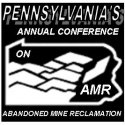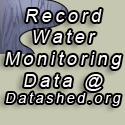Today, EPCAMR’s Program Manager, Michael Hewitt, is officially a Geographic Information Systems Professional (GISP)! His certification application was approved by the GIS Certification Institute.
“It’s nice to add a few letters to the end of my name,” Mike said as he changed his business card to read Michael A. Hewitt, GISP. “Like a PE or PG, now there is something to signify that I can make a map,” he joked.
The GISP certification is really nothing to joke about. The application process examines an applicant’s GIS working history and includes a minimum of requirements for documenting educational achievement, professional experience, and contributions to the profession.
What is a GISP?
A GISP is a certified Geographic Information Systems Professional who has had their professional background scrutinized and reviewed by an independent third party organization, an institute comprised of leading non-profit associations (AAG, NSGIC, UCGIS, GITA, URISA, GLIS), focused on the application of GIS and geospatial technology.
A GISP must abide by higher guidelines for ethical behavior and continue to educate and reeducate him or herself in order to prepare for re-certification.
There are GISPs all over the world. Current active GISPs reside in all 50 states and 25 foreign countries.
A GISP is more than a practitioner of GIS technology. A GISP is a professional to his or her practice.
Minimum Required Points for Initial Certification
The GISP applicant is expected to be knowledgeable of the ethical considerations of this industry and does and will continue to conduct him or herself in an ethical manner in all aspects of the job.
Experience is the most important factor in applying skills to real world problems, and education plays a very important role in providing the knowledge and intellectual maturity required to approach problems and communicate solutions effectively. In addition, professionals must contribute to the advancement of the profession by donating their skills in professional efforts not designed for individual compensation, but rather to maintain the fundamental health of the profession.
This forms the basis for the minimum number of points required in each category. The minimums are based upon a model GISP who possesses the following characteristics: a baccalaureate degree in any field supplemented with a number of courses, workshops, seminars, conferences, and other documented educational activities whose subject matter relates directly to GIS and geospatial data technologies; at least four years of equivalent full-time experience in a position that involves spatial data compilation, teaching, GIS analysis, design, or programming; and more years in a GIS user position; and a demonstrated record of participating and/or presenting in GIS conferences, publications, or GIS-related events (i.e., GIS Day).
The minimum number of points needed to become a certified GISP is 150 points. “I documented over 200 points and stopped so I don’t look like an overachiever, but I do have about 15 years of experience using ArcGIS and other mapping programs,” Mike remarked. “I also heard that in 2015, the application process will require a test, so I got it out of the way this year.”











